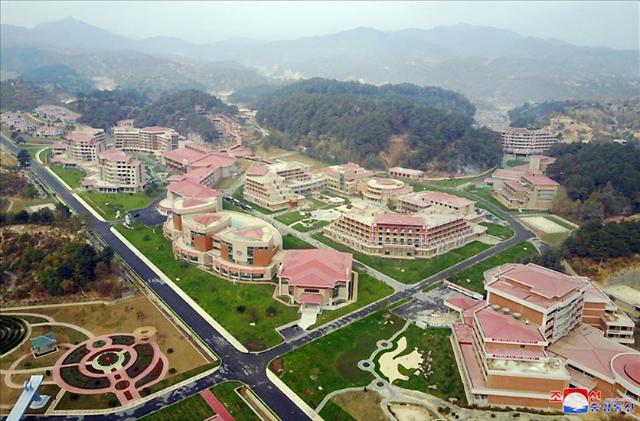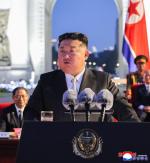
[KCNA / Yonhap Photo]
On October 25, Pyongyang called for inter-Korean discussion by means of document exchanges to remove facilities in the Mount Kumgang resort, two days after its leader issued a surprise order to transform ''unpleasant-looking" facilities into a modern world-level tourist destination. Facilities in the resort have been left unattended since a South Korean housewife was fatally shot by a North Korean guard in 2008.
In a message sent on Monday, Seoul made a counter-proposal for working-level talks between South and North Korean authorities, according to the South's unification ministry in charge of cross-border affairs.
"It is our government's position that the Mount. Kumgang tourism issue requires a meeting between authorities anyway," ministry spokesman Lee Sang-min told reporters. South Korea is willing to discuss issues raised by North Korea's and "the direction of new developments" in Mount. Kumgang, he said, describing the resort as "not only a certain spatial function as a tourist area, but also a meeting place for separated families and a space for social and cultural exchanges."
Citing a different environment, Seoul has indicated it may seek Washington's concessions and understanding in keeping the inter-Korean tour program alive.
During his inspection of the resort last week, North Korean leader Kim Jong-un ordered the demolition of South Korean facilities, criticizing a "mistaken" policy adopted by his late father to capitalize on foreign capital. Kim set forth detailed tasks for changing "awkward-looking" facilities into a modern cultural tourist resort.
Tourist facilities in the resort were built mainly by Hyundai Asan, an arm of South Korea's Hyundai Group, under an agreement with North Korea's late leader Kim Jong-il. Pyongyang allowed South Korean tourists to visit Mount Kumgang in 1998 to receive hard currency from abroad and opened a land route in 2003.
In his New Year message, Kim Jong-un called for the unconditional resumption of suspended inter-Korean projects such as cross-border tours and a joint industrial zone in the border town of Kaesong, which used to be a symbol of inter-Korean cooperation. The Kaesong zone, which was opened in December 2004, once hosted about 120 South Korean firms manned by more than 50,000 North Korean workers. Seoul shut it down in 2016 in retaliation for the North's ballistic missile and nuclear tests.
South Korea has been cautious as Pyongyang has yet to resolve a dispute with the United States over how to achieve denuclearization to a point that could satisfy the international community so that sanctions can be lifted. Washington has maintained a tough stance until North Korea entirely dismantles its nuclear program,
Copyright ⓒ Aju Press All rights reserved.



